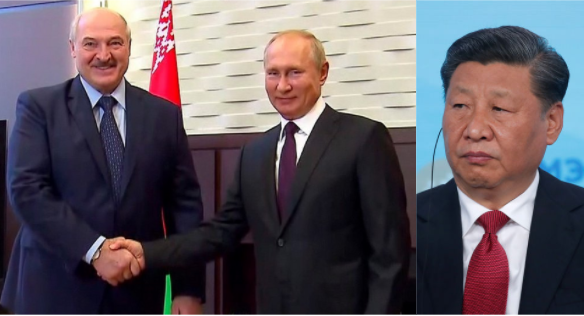Merely months after humbling the Chinese President Xi Jinping in the competitive rivalry to win over Belarus- a former Soviet State, Putin is now sealing his Belarus triumph. The Parliamentary Assembly of the Union-State of Belarus and Russia’s Commission of Foreign Policy met virtually on Monday, in order to achieve the goal of political integration between the two countries.
Political integration between the two countries will bring the two former Soviet Republics into much greater cohesion and ensure almost complete political union of Belarus with Russia. Till now, political integration was a contentious issue between Minsk and Moscow. Putin wanted the political union, but Belarus President Alexander Lukashenko wanted to assert independence amidst growing economic ties with the EU and China. However, recent events surrounding political instability in Belarus have compelled Lukashenko to accelerate political integration.
The issue of a political union in the two former Soviet Republics traces its origin in 1999 Union-State Treaty which laid down the path for achieving integration and also established supportive institutions to guide such a union. However, till 2018, this goal remained unfulfilled.
In December 2018, Russia made the first big attempt by making it clear that Minsk would continue to receive discounted oil and gas, along with preferential access to the Russian market, if it agreed to move towards a political union in line with the 1999 treaty.
Belarus and Russia also got locked into intense negotiations last year. But Lukashenko was simply not giving up. The Belarus President even said, “Some two years ago I told the president of Russia that no one in Belarus would ever be able to do this. Even if I decide to go for it, Belarusians will get rid of me within one year after the decision is taken.”
The Kremlin even tried to squeeze the Belarusian economy and get Minsk to move towards political integration. Moscow also reneged on the promise of a 600 million US dollars loan to Belarus. But then the Lukashenko administration secured a 500 million US dollars from the China Development Bank.
Emboldened with Chinese money, the Belarusian Finance Minister Maksim Yermalovich had said, “We do not consider the loan of the government of the Russian Federation as a source of funding and, in fact, are not negotiating on this loan.” He had added, “We have not provided any requests to the Russian side. We do not expect to receive the Russian loan.”
The EU too was letting China embolden Belarus against Russia, and did not sanction the Lukashenko administration even when it became known that the Belarus dictator was ruling the former Soviet Republic with an iron fist.
But luckily for Putin, the Coronavirus Pandemic suddenly squeezed the Belarusian economy, much like the rest of the world. And then the big event- Belarus Elections also took place in August this year.
Lukashenko has been the pre-decided winner of every Belarus election since 1994. 2020 was no different. However, this time around people of Belarus decided to hit the streets. They were fed up of their dictator-President who failed to combat the Coronavirus Pandemic and also faced serious allegations of rigging the Presidential polls.
Suddenly Lukashenko also found that there was no one whom he could bank upon except Putin. The Belarus President had to approach the Russian President for quelling the unrest that gripped the former Soviet Republic. In fact, Lukashenko told Putin, “These events have shown us that we need to stay closer with our older brother.”
So, Russia helped Lukashenko quell pro-democracy protests in Belarus. And in return, Lukashenko agreed to an accelerated pace of political integration between the two former Soviet Republics. Lukashenko probably realised that it is better to be an effective provincial government in a Russia-Belarus union, rather than getting toppled by pro-democracy protests.
Putin’s ability to fizzle out seemingly uncontrollable protests and Lukashenko’s fragility has thus paved the way for a political union between Russia and Belarus.
